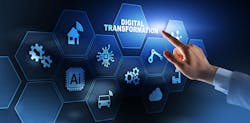Digital Transformation Is Increasingly about Reimagining Manufacturing’s Business Model
While the adoption of technology and automation in manufacturing processes has grown significantly in recent decades, manufacturing business models have largely remained the same: organizations purchase raw materials, process them into a finished product, and sell that product to customers. But there are signs that this status quo is changing, as many industrial equipment companies are building new business models with digital technologies and data as their centerpiece.
The ability to use data-driven insights is redefining manufacturers’ value proposition. Companies are building Industrial Internet of Things (IIoT)-based technology platforms to provide digital solutions that increase productivity across the manufacturing enterprise, and some companies are building connected products that yield insights into customer operations.
The pandemic has brought to light the need for the industrial sector to make greater digital investments in cloud technologies to enable remote work, remote equipment maintenance and monitoring, predictive maintenance to plan for downtime, and technologies to track goods and improve supply chain visibility, to name a few.
Such investments are being made not only to improve internal efficiencies, but also to redefine companies’ value proposition to customers through technology and data-enabled business models. Some companies are developing technologies in house, while others are making acquisitions or forming partnerships with tech companies to stay ahead of the trend. As a result, software is becoming a more common element in industrial merger and acquisition deals.
The Journey to Digital
Most manufacturing companies have undertaken digital transformation efforts in some way, though the range of digital maturity is broad. Some organizations struggle to define the scope of this transformation and what they intend to achieve, while others have a clear digital strategy to adapt to the fast-changing industrial environment.
What is becoming clearer throughout the sector is that digital transformation is about more than just using technology to make processes more efficient—it is about transforming the business model itself. The pandemic has accelerated this reimagining of business and operating models as companies move from adapting to uncertainty to thriving in uncertainty.
Deal data this year indicates how technology is making its way into business models. “Just over halfway through 2021, the M&A market is perking back up, and technology acquisitions are still a priority, accounting for about 7% of U.S. industrial transaction volumes,” Bloomberg analyst Brooke Sutherland wrote in July.
As of October 2021, software deals accounted for almost 10% of all industrial M&A deals, according to Bloomberg.
Recent notable deals include Schneider Electric’s acquisition of industrial software provider Aveva. Emerson, which last year acquired power industry operations software provider Open Systems International, recently announced it will combine its industrial software business with Aspen Technology Inc. Roper Technologies is forging ahead with a software-dominated business model and divesting legacy assets. Regal Beloit recently acquired midsized Rexnord’s process and motion control business that has a strong portfolio of Industrial Internet of Things solutions. These and other such deals are driving up premiums for industrial software companies.
Digital Business Models
Many industrial companies consider their domain expertise as a differentiator over lower-cost competitors and are adopting digital and software-based business models that exploit this expertise.
Industrial stalwarts such as Schneider Electric, Honeywell, Rockwell Automation, Siemens, GE and others have long been building technology platforms that magnify and monetize these differentiating characteristics by analyzing customer usage and operational data, applying domain expertise and generating powerful insights that can be game-changing to the customer. These data-driven, IIoT-enabled operating platforms not only provide powerful analytic insights but also accelerate the customer’s own digital journey. With these insights, companies can provide various value-add services to help customers get better performance from their assets.
Some companies like Caterpillar and John Deere now sell connected products; i.e., tractors and construction equipment that collect customer data to generate insights that can help them increase productivity and efficiency. Midsize industrial companies should seize on the opportunity to assess how they can use data generated from their operations to empower their domain expertise and open up new portals to be more relevant to their customers.
Other equipment companies have moved to “equipment as a service” business models, which sell machinery uptime instead of the machine itself. By remotely monitoring the machine’s operations, equipment suppliers get precious information on the operating conditions that enhance or limit the equipment performance. Not only does the customer benefit from these insights, but the feedback also allows equipment suppliers to further enhance their products.
The growing focus on software makes sense, as software revenues typically yield higher margins than traditional business models and are locked in through recurring subscription revenues that provide better resistance to dips in economic cycles. Recurring subscription-based models also help to sustain customer engagement throughout the customer lifecycle, unlike more traditional models where engagement significantly reduces after the initial sale.
While many organizations in the industrial sector are making these investments, the industry in general still needs to understand that such digital investments are critical for a sustainable future. A common approach, as John Barcus, group VP of Oracle’s industry strategy group puts it in this MIT Technology Review article, is that “If it works OK today, I can wait until tomorrow to fix it. And then, all of a sudden something new hits that they weren’t prepared for and they have to react.”
Technology will play an inevitable role in the future of manufacturing. As everybody across the manufacturing ecosystem—suppliers, manufacturers, OEMs, and distributors—embraces the digital evolution in some form or fashion, the choice is no longer whether or not to go digital but instead how fast they can do so.
Shruti Gupta has more than 15 years of experience advising multinational clients on their transfer pricing planning, supply chain structuring, global compliance and controversy management strategies. She is a senior analyst in RSM’s Industry Eminence Program, which positions its analysts to understand, forecast and communicate economic, business and technology trends shaping the industries RSM serves.
